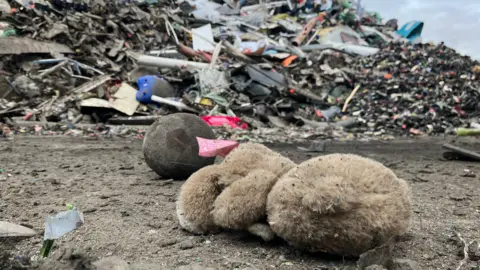Race to buy waste depot to avoid recycling fines
 Caerphilly council
Caerphilly councilAn area with one of Wales' worst recycling rates will borrow millions to pay for its plans to deal with waste, including opening a new depot.
Caerphilly had the second lowest percentage of waste reused, recycled or composted in 2022/23, according to official figures.
But the clock is ticking on a potential deal for a site, which Caerphilly council must effectively agree to buy in October or the landowner will reportedly "pursue other options".
Council leader Sean Morgan said borrowing money "is just going to add to our woes" with an estimated £45m in savings needed in the next two years, but head of finance, Steve Harris, said doing nothing would leave it open to multimillion-pound annual fines.
The depot will be key to the council’s waste strategy as figures show its recycling rate was 60.7% last year, better only than neighbouring Torfaen's 58.7% out of Wales' 22 counties.
Earlier this year Wales was confirmed as second best country in the world for recycling.
The Welsh government is aiming for it to be recycling, reusing or composting 70% of its waste by 2025 and be a "zero waste nation" by 2050.
Caerphilly has to increase its recycling rates to 70% next spring or face millions of pounds in Welsh government fines.
Senior councillors have endorsed a plan to borrow £24m to fund its waste strategy, including the purchase of the depot site.
Councillor Chris Morgan, the cabinet member for waste, said the strategy would "ensure the council meets and exceeds its statutory performance targets".
Those improvements, and the need to comply with new government rules on businesses sorting their own recycling, mean the council has to make major upgrades.

The location of the chosen depot site remains secret while negotiations continue, but a deal is expected to be wrapped up soon.
Caerphilly's strategy also includes a plan to make residents sort their recycling at home, although a date for this has not yet been set.
Changes to bin collections, garden waste services and tip opening hours could all be on the cards, following a public consultation.
At current performance levels, the council could face annual fines of £2.7m.
It has calculated that borrowing costs on a 25-year loan will be "broadly in line" with what it would have to otherwise pay in fines, and secures better recycling infrastructure.
Mark Williams, the council’s corporate director for the environment, said the Welsh government had confirmed it would contribute 60% of the funding, leaving the council to pay £24.8m.
